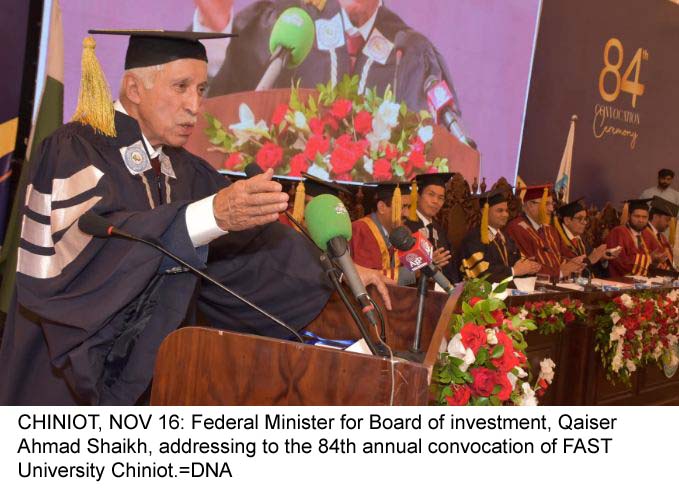
FAISALABAD/CHINIOT, NOV 16 (APP/DNA): Federal Minister for Investment Board Qaiser Ahmed Sheikh emphasized that Pakistan’s future hinges on restoring education as its top national priority, warning that the country’s economic decline begins when it stops investing seriously in learning, planning, and human development.
Speaking at the convocation of FAST National University’s Chiniot-Faisalabad Campus on Sunday, he noted that countries which invested earliest and most consistently in education have emerged as global leaders. Pakistan, he said, cannot afford to stand still at this critical juncture.
He reflected on how Pakistan and South Korea once shared almost identical economic standing, with both nations closely studying each other’s developmental models. He recalled that Pakistan’s five-year plans were considered exemplary by South Korea’s Ministry of Education and Planning in the 1960s, with both countries benefiting from this exchange of ideas.
Such historical comparisons remind us of Pakistan’s untapped potential, which can only be unlocked through an unwavering commitment to quality education at all levels, he added.
He emphasized that in his recent speech to the National Assembly, he stressed the same point: unless Pakistan strengthens its 12-year foundational education, higher education alone cannot accelerate national development.
He pointed out that performance trends from cities like Karachi demonstrate the need to improve schooling standards before expecting excellence in universities. Countries like Thailand, he said, had experienced economic growth after recognizing education as a fundamental economic building block, not merely a social service.
The Minister congratulated the graduates and stated that the burden of Pakistan’s progress now rests on their shoulders. He also acknowledged their parents for entrusting their children to an institution that has consistently delivered world-class academic standards.
He reflected on the initial doubts surrounding the establishment of FAST University’s Chiniot campus, which now stands as a beacon of academic success for the entire region.
The campus began as a personal vision, he shared, with his family, friends, and company collectively providing 10 acres of land at a time when many doubted that a FAST campus in a relatively remote district would succeed. “People said it would fail, but today the success of FAST Chiniot is visible to everyone,” he stated, citing increasing enrollments, modern facilities, and strong student performance as evidence of the decision’s success.
Qaiser Sheikh also announced Rs. 1 million for gold medal recipients and another Rs. 1 million for deserving students, stating that financial support nurtures talent and maintains academic motivation.
He praised Pakistan’s youth for their extraordinary potential and said that with the right guidance and a clear sense of direction, they could excel on global platforms.
He stressed the importance of computer science and emerging technologies as the backbone of Pakistan’s future and urged graduates to lead the country into an era of innovation, data science, artificial intelligence, and modern engineering. FAST University, he added, has already positioned itself as one of the most reliable institutions for producing globally competitive professionals.
He concluded that Pakistan’s economic revival, technological advancement, and institutional strength depend heavily on educated youth who understand their responsibilities. He expressed confidence that FAST graduates would emerge as leaders in academia, industry, and public service, making significant contributions to national development.
Director of Sapphire Group, Muhammad Younus, also addressed the convocation, emphasizing that education is the strongest pathway to a secure and progressive future. He pointed out that the world is advancing at an unprecedented pace, driven by science, technology, and innovation, and only nations that embrace research, critical thinking, and modern knowledge can compete globally.
He further highlighted the 21st century as an information age, where economies thrive on skills, creativity, and problem-solving rather than traditional industries alone.
Praising FAST University for its significant contributions to Pakistan’s technological and economic growth, he noted that the university has achieved remarkable milestones in a short period. From developing skilled graduates to supporting research and local industry, he said, FAST University is shaping the future of Pakistan. He also mentioned that FAST allocates over Rs. 80 million annually in financial aid, benefiting more than 2,000 students.
He congratulated the graduating class, urging them to step confidently into practical life with dedication, humility, and a commitment to serving the nation. He reminded the graduates that the true purpose of education lies in its application, and that their success is rooted in the support of their parents, teachers, and the university’s leadership.
Prof. Dr. Aftab Ahmad Maroof, Rector of the National University of Computer and Emerging Sciences, commended the university for equipping students with the skills, mindset, and confidence necessary to transition swiftly into the workforce.
Acknowledging the contributions of faculty, campus management, and especially parents, he stressed the pivotal role that families play in shaping a student’s academic journey.
He urged the graduates to recognize the immense challenges Pakistan faces and step forward to solve them. He encouraged them to embrace entrepreneurship and innovation, advising young professionals to gain industry exposure before exploring entrepreneurial ventures that address Pakistan’s needs.
He shared inspiring stories from FAST’s history, including major land donations that enabled the development of the Lahore and Chiniot campuses, and highlighted the university’s commitment to managing resources with transparency and integrity. He also called on the graduates to stay connected as proud alumni, reminding them that FAST’s facilities and support networks would always be open to them.
Prof. Dr. Shahzad Sarfraz, Director of the FAST Chiniot-Faisalabad Campus, presented the welcome address and highlighted the campus’s achievements. He informed the audience that degrees were conferred in PhD Electrical Engineering, MS Computer Science, MBA, BS Electrical Engineering, BBA, BS Computer Science, and BS Software Engineering, with medals and awards presented to high-performing students.
The ceremony was also attended by H.E. Mr. Rongvudhi Virabutr, Ambassador of Thailand and Chair of the ASEAN Committee in Islamabad (ACI), H.E. Dato’ Mohammad Azhar Mazlan, High Commissioner of Malaysia, H.E. Mr. Wunna Han, Ambassador of Myanmar, and other distinguished guests.
Later, the minister distributed shields among the ambassadors and other guests.
















